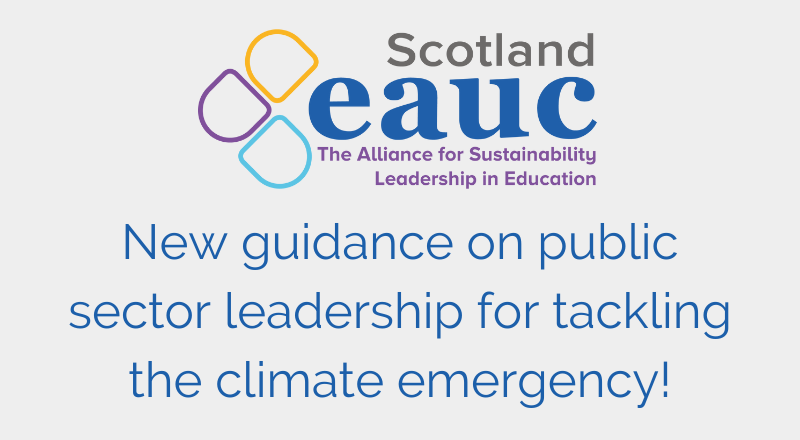The leaders of Scotland’s public bodies have a key role to play in the crucial period to 2030 in the shared national endeavour to tackle the global crises of health, climate emergency and biodiversity loss.
The Scottish Government has published guidance on public sector leadership for tackling the climate emergency, to accompany the changes to Public Bodies Climate Change Duties (PBCCD) reporting that come in to effect from 2022. EAUC-Scotland was part of the working group that supported the development the guidance.
EAUC-Scotland will develop a briefing note exploring the guidance in further depth, however here are some initial key guidance expectations and targets:
- Institutional boards and senior executive teams must ensure that climate change systemically informs strategic investment planning and decision-making processes and is embedded into the management of risks and opportunities across the organisation. Climate change must be integrated into financial planning and reporting (page 17).
- All relevant Scope 1 and 2 emissions must be reported; and all relevant and significant Scope 3 emissions must be reported (page 28).
- Data uncertainty for emissions categories is recognised as an issue but is not viewed as a barrier to reporting as this supports transparency (page 29 & 30).
- Zero direct emissions from all estate buildings by 2038 at the latest (page 35).
- All new fleet cars and light vehicles as zero emission by 2025 and larger new vehicles by 2030 (page 39).
- Air travel should be minimised where possible; where air travel is unavoidable, passenger 'class' should be the most emissions efficient as possible; and mainland UK air travel should be eliminated (page 41).
- Emissions from homeworking must be accounted for in reporting (page 42).
- For emissions produced within Scotland it is strongly recommended to offset with Scottish natural sequestration projects. It is recommended that international offsets should only be considered for emissions generated outside of Scotland (e.g. international flights) and be carefully assessed and fully verified (e.g. Gold Standard). Public bodies are still required to reduce emissions as much as possible before considering offsets (page 49).
SSN will be looking at the guidance in depth during its "COP... Now What?" on the 8th of December.
The full guidance document can be accessed here.












